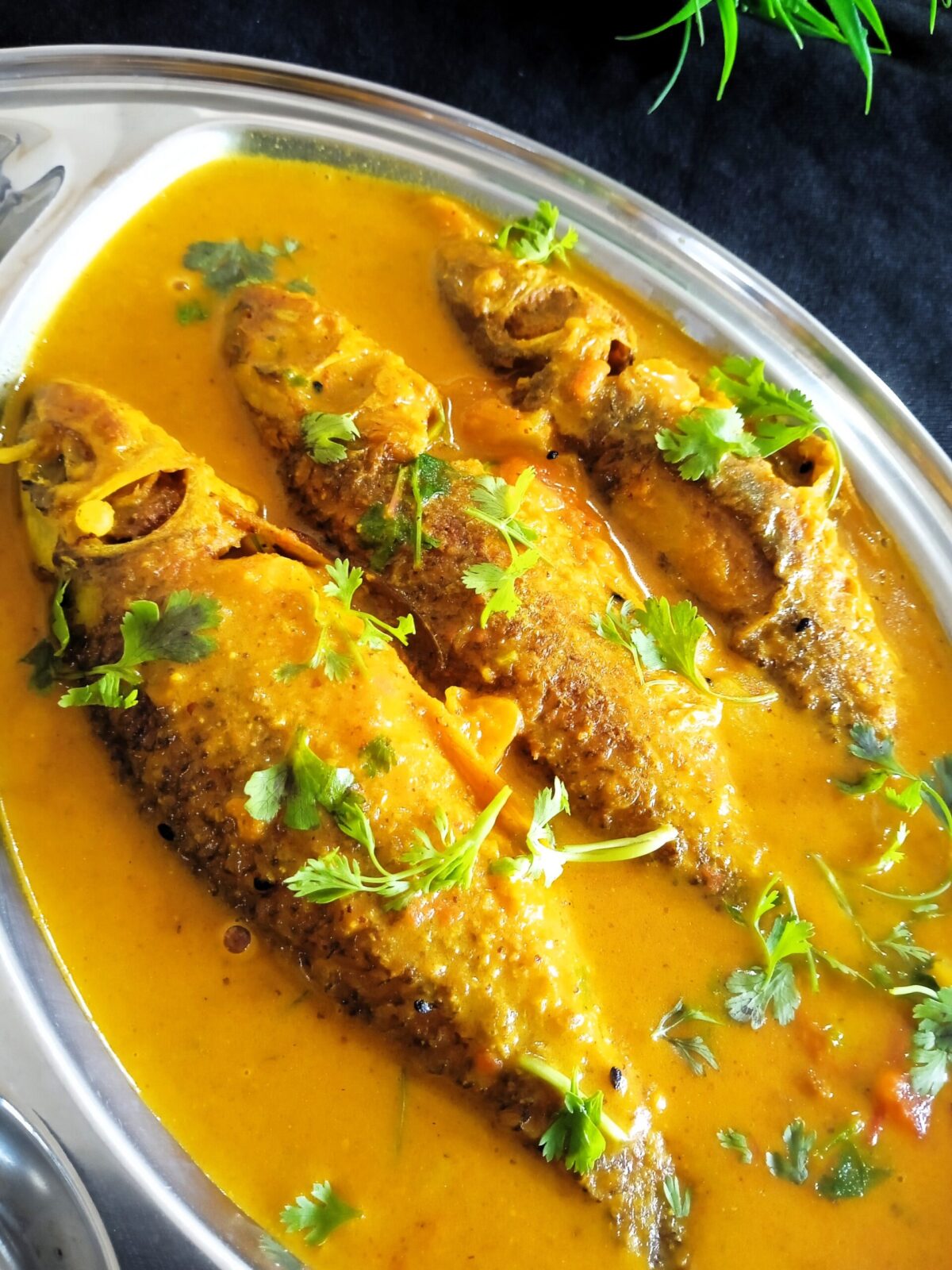Bengali Fish Curry with poppy seeds-Bengali cuisine is known for its variety of fish curries that are flavorful and aromatic.
Recipe Card:

Authentic Fish Curry | Bengali Fish Curry With Poppy Seeds
Bengali Fish Curry is a classic dish in Bengali cuisine that combines the tender texture of bata fish with a flavorful mustard and poppy seed gravy. This traditional recipe, known as Shorshe Bata Maach, is prepared with a blend of aromatic spices and cooked to perfection, creating a dish that is both hearty and delicious. Whether served as part of a daily meal or for special occasions, this fish curry is sure to be a hit with rice. Dive into the rich and tangy flavors of Bengali fish curry with this easy-to-follow recipe!
Ingredients
Ingredients
- 500 g Bata Fish or any small fish of your choice
- 1 teaspoon raw cumin seeds
- 3 teaspoons poppy seeds khus khus
- ½ teaspoon kalonji seeds nigella seeds
- 3 dry red chilies
- 1- inch ginger piece
- 4 cloves garlic
- 2 medium-sized tomatoes optional
- ½ teaspoon turmeric powder
- Salt to taste
- 2 tablespoons mustard oil
- 1 bay leaf
- 1 red chili
- 1/2 teaspoon rewd chili powder
- 1 cup water adjust as needed
- Fresh coriander leaves for garnish
Instructions
Step-by-Step Recipe: Bengali Fish Curry with Poppy Seeds
Step 1: Prepare the Fish
- Start by washing the Bata fish thoroughly. You can use any small fish for this recipe.
- Marinate the fish with salt and ½ teaspoon turmeric powder. Set it aside for 5 minutes.
Step 2: Prepare the Masala Paste
- In a grinder, add 1 teaspoon raw cumin seeds, 3 teaspoons poppy seeds, 3 dry red chilies, 1-inch ginger, 4 cloves garlic, and salt. Grind them into a smooth paste.
Step 3: Fry the Fish
- Heat a pan and add mustard oil. Once the oil is hot, fry the marinated fish pieces on medium heat until golden brown on both sides. Remove the fish and set it aside.
Step 4: Prepare the Gravy
- In the same pan, add a little more mustard oil if needed. Add ½ teaspoon kalonji seeds, bay leaf, and dry red chili. Stir for a few seconds.
- Add chopped tomatoes (optional) and 1/2 teaspoon turmeric and red chili powder powder. Cook until the tomatoes turn soft.
- Once the tomatoes are soft, add the masala paste and cook for 2-3 minutes on medium heat until the raw smell disappears.
Step 5: Add Water and Fish
- Add 1 cup water (adjust according to the desired consistency). Let it come to a boil.
- Gently place the fried fish into the gravy. Let it simmer for 5 minutes so the fish absorbs the flavors.
- Garnish with freshly chopped coriander leaves and serve hot with steamed rice or roti.
Notes
- For an authentic Bengali flavor, always use mustard oil. Heating it until it reaches its smoking point helps mellow its sharpness.
- If you’re new to using poppy seeds (posto), soak them in warm water for 15-20 minutes before grinding. This ensures a smooth paste.
- The recipe allows for flexibility. You can adjust the amount of mustard seeds, garlic, and ginger according to your preference.
- A pinch of salt in the spice paste is crucial to avoid any bitterness in the final dish.
- For a purely poppy-seed-based curry, you can skip the mustard seeds and other spices, focusing entirely on the nutty flavor of posto.
- This dish is best enjoyed fresh, with hot steamed rice to soak up the rich gravy.
Nutrition value (Bengali Fish Curry per 4 servings):
| Nutrient | Amount Per Serving |
|---|---|
| Calories | 250 kcal |
| Protein | 20g |
| Carbohydrates | 8g |
| Dietary Fiber | 2g |
| Fat | 16g |
| Saturated Fat | 3g |
| Cholesterol | 70mg |
| Sodium | 500mg |
| Potassium | 350mg |
| Vitamin A | 12% DV |
| Vitamin C | 15% DV |
| Calcium | 10% DV |
| Iron | 15% DV |













I love bengali fish curries… Kuch dino se apki page follow kar rahi.. Apke recipes bohot easy to use hoti hai.. Bohot sare recipes try bhi k hu aur bohot tasty bhi bana hai, mai bihar se hu aur mujhe fish curry etni achi se banana nahi ati thi but apki recipes pad kar kafi had tak fish curry banana sik gae..
Hi Rubi,Aapka pyara comment padke bohot acha laga, Yeh jaan ke khushi hui ki aapko meri recipes pasand aa rahi hain aur use follow karna easy lag raha hai. Aur yeh sun ke aur bhi acha laga ki aap ab fish curry banana achhe se seekh gayi hain, especially jab apke area ki flavors thodi alag hoti hain. Aap aise hi naye recipes try karte rahiye aur enjoy kijiye. Agar apko koi specific recipe chahiye ya kuch puchna ho, toh bina jhijhak bataye. Happy cooking!